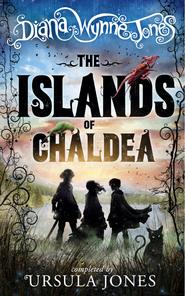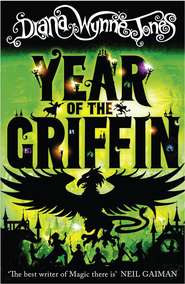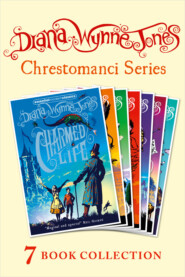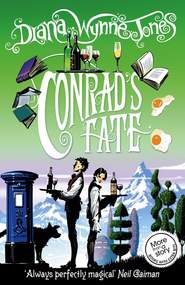По всем вопросам обращайтесь на: info@litportal.ru
(©) 2003-2024.
✖
Diana Wynne Jones’s Fantastical Journeys Collection
Настройки чтения
Размер шрифта
Высота строк
Поля
“As you know,” he said to us – all of us, though I think he spoke chiefly to my aunt – “ten years ago, the magicians of Logra cast a spell on our islands of Chaldea so that no one from here, however hard they try, can get to Logra.” He nodded to the Priest, who was so grimly eager to speak that he was sidling in his seat.
“We have tried, gracious king,” the Priest burst out. “We have searched the whole of Skarr for some inkling of the spell. We have gone out – I myself have gone out in boats repeatedly – as far as the barrier in the sea, where the boats turn aside as though a current takes them, though there is nothing to be seen. And we have used every craft the gods grant us to break the spell. But we have found no way to break this spell.” He subsided, sort of shrinking into himself gloomily. “I have failed,” he said. “The gods are not pleased with me. I must fast and pray again.”
“There’s no need to reproach yourself,” King Farlane said.
Donal could obviously not resist muttering, “Och, man, leave your gods to punish you. If they are that angry, they can surely take away your next dinner for themselves.”
At this, our old Dominie gave Donal a mildly quelling look and turned his head questioningly to the High King. King Farlane nodded and the Dominie said, wagging his white eyebrows sadly, “I have had my failures too. It pains me, as a scholar, to say this, but I have now searched in every library on Skarr and journeyed to Bernica to search there too, without stumbling across a single hint of how this spell was constructed.”
Oh! I thought. This explained those lovely unexpected days when I had walked to the castle for my lessons to find all the other children rushing around the yard, shouting that old Dominie was on his travels again.
“On the other hand,” the Dominie continued, “the clue may lie all around us in the geography of our very islands.”
I sighed. The Dominie had a passion for geography. He was forever making us draw maps and explaining to us how the lie of the land influenced history: how this inlet made a perfect harbour and caused the town to grow, or how that lone mountain sheltered this valley and made it so fertile that wars were fought for it. Sure enough, he went on instructing everyone now.
“As you know,” he said, “our three islands form a crescent with Skarr to the north, Bernica due west and Gallis in the south, slanted south-eastwards, while Logra forms a very large wedge to the south-east. Now I have it in mind that the three Chaldean islands could be seen to form the sign for the dark of the moon, which also happens to be the sign for banishment. It would take no stretch of the imagination for the Lograns to see Logra as the full moon bearing the shield of banishment before it. The Lograns, as you know, went to war with us purely and simply because their gods told them it was their right to conquer Chaldea—”
This was too much for half the people there. They forgot the reverence that should be due to the High King and burst into protest. Donal contented himself with a sarcastic noise, but the Priest unshrank himself and snarled, “The Lograns will burn for their false beliefs!”
Aunt Beck, who was sitting in a demure and graceful attitude on her stool, which I wished I could emulate, with her red heels sweetly together and her bony, sensitive fingers clasped around her knees, tossed her small dark head and very nearly snorted. “There’s no gods to it,” she said. “It was human greed.”
And King Kenig said across her, “Gods, my left hambone, man! Our islands have gold and silver, tin and copper. Gallis has pearls and precious stone as well. What has Logra got? Only iron. And iron makes weapons to conquer the rest with.”
The Dominie stuck his lower lip out like a small child and his eyebrows bristled around at the rest of us. “When one talks of magic,” he said huffily, “the impossible is possible.”
“Indeed, yes,” the High King put in quickly. “Perhaps we should ask what Beck the Wise Woman has to say about the spell.”
He looked at my aunt, who bowed her head gracefully back. “Very little, I’m afraid, sire,” she said. “Bear in mind that I have had my sister’s child to care for and could not be going out in boats or ranging over Skarr. But I have scried and found no answer. I have put bonds on invisible spirits and sent them out all over Skarr.”
I watched Aunt Beck doing this. She claimed that all the islands swarmed with spirits, but I still found this hard to believe when I couldn’t see them, or hear what they reported when they came back.
“They could find nothing of the spell,” Aunt Beck said, “and nor could they find any way through to Logra. They all say it’s like a wall of glass in the sea between Logra and Chaldea. But they do tell me one thing that worries me. As you know, this world has four great guardians.” She looked to the Priest, who pinched his lips in and nodded grudgingly. “These guardians,” Aunt Beck said, “belong to North, South, East and West, but in the nature of things they each have one of our four islands to guard. Ours, as you know, in Skarr is of the North. Bernica is guarded by the West, Gallis by South. Logra should have East, but the spell has cut guardian off from guardian so completely that none of our three know if East even exists any more.”
“That’s not important,” King Kenig said curtly.
“I regard it as of the utmost importance,” Aunt Beck said.
“Well, it may be, it may be,” the King conceded. “But the main thing from a king’s point of view is that, while this magical blockade is in place, the Lograns can build ships and train armies in perfect peace. And, what is worse, they can send spies through to watch us, while we have no way of spying on them. This is why we’re all meeting here in such secrecy – fear of Logran spies.”
“It is indeed,” the High King agreed, “and of course we may not be seen to build ships or train soldiers because the Lograns hold a most valuable hostage in my son Alasdair. You are aware of that, are you?” he asked, turning to Ivar and me.
Maybe he thought we were too young to know, since I was three when Prince Alasdair was taken and Ivar was eight, but I cannot imagine how he thought we didn’t know. It was, even Aunt Beck grudgingly agrees, the most astounding piece of magic Logra ever did. She says it must have taken far more planning and clever timing than simply making the barricade.
About a year after the barricade was in place, Prince Alasdair – who must have been about Donal’s age then – was coming in from hunting with quite a crowd of courtiers, when, in the very courtyard of Castle Dromray, which is the High King’s seat here on Skarr, a tunnel somehow opened in space and soldiers came rushing in out of nowhere. They shot Prince Alasdair in the leg and then carried off every one of that hunting party, horses and all. People watched from the walls and windows of the castle, quite helpless. Long before they could get down to the courtyard, the tunnel was closed and everyone gone.
I know more about it than most because my father was one of that hunting party. I nodded. So did Ivar.
“And no news of Prince Alasdair ever after, I believe, sire,” Ivar said.
The High King lifted his head and gazed into the coals of the brazier a moment. “As to that,” he said, “we are not sure. No, indeed, we are not sure. Rumours, and rumours of rumours, continue to reach us. The last words were so definite that it seems to us and to all our advisors that there must be a crack or so in the wall between Chaldea and Logra.”
“And those words are, sire?” asked my aunt.
“That the spell can be breached and Prince Alasdair rescued,” the High King answered, “and that the answer can be found if a Wise Woman journeys from Skarr, through Bernica and Gallis, and enters Logra with a man from each island. This would seem to mean you, my lady Beck.”
“It does indeed,” my aunt replied drily. “And where are these words from, sire?”
“From a number of quarters,” said King Farlane. “As various as a fishing village at the east of Skarr, word from two of the five kings and queens in Bernica, and two priests and a hermit in Gallis.”
“Hm.” My aunt unwrapped her hands from her knees and put her chin in one. “The words always the same?” she asked.
“Almost exactly,” said the High King.
There was a moment of silence, in which I wondered what would become of me if Aunt Beck went off to Logra and never came back. The only good thing I could see was that no one would require me to go down to the Place then.
Then, as Aunt Beck drew in breath, almost certainly ready to say “Nonsense!”, the High King – whose gift, I was beginning to see, was to put his word in at the right moment – spoke again. He said, “Our plans are made, Wise Beck. You and your apprentice leave secretly this evening. We have a boat waiting for you over the hills in the pool of Illay, and our captain has our orders to sail for Bernica while we and our court journey back to Dromray, giving out that you are with us. This will deceive any spies.”
I have seldom seen my aunt discomposed, and never so discomposed as then. Her chin shot up out of her hand. “Go now?” she said. She looked from the sick king to the hearty, well one, King Kenig, and then to the Priest, the Dominie and Donal sitting admiring his bracelets again. There was almost panic in her face as she realised they were all in this together. She looked up at the expressionless men behind the High King’s chair. She even glanced at the Queen who, like Donal, was playing with a bracelet. “Aileen is too young to go,” she said. “She’s not even initiated yet.”
“She has heard our council,” the High King said gently. “If you like, we can take her to Dromray, but she must be closely confined there.”
I found my face jumping around from King Farlane to my aunt. It is awful when you sit there thinking the talk is all distant politics and then suddenly find it is going to change your whole life. I was on pins.
“I can’t go tonight,” my aunt said. “I have no clothes for the journey.”
The Queen spoke for the first time, smiling. “We thought of that,” she said. “We have clothes already packed for you and Aileen.”
Aunt Beck glanced from me to the Queen, but she still gave no indication of what she was going to do with me. Instead, she said politely, “Thank you, Mevenne. But I still can’t go. I have livestock to feed in my house – six hens, two pigs and the cow. I can’t let them die of neglect.”
“We thought of that too,” said King Kenig jovially. “My henwoman will take the hens and Ian the piper will see to the rest. Face it, Beck, you’re off to save all Chaldea, woman, even if it is at short notice.”
“So I see,” said my aunt. She took another unloving look around the various faces. “In that case,” she said, “Aileen goes with me.” I was so overwhelmed at this that I only heard it as if from a distance, Aunt Beck adding, “Who is to go with me? Who is the man from the island of Skarr?”
The High King replied, “Prince Ivar is that man, naturally.”
I was jolted from my rapt state by Ivar’s great hoarse cry of “Wha-at!”
“You have, like young Aileen, heard all our plans,” King Farlane pointed out.
“But,” said Ivar, “I only have to set foot in a boat and I get sick as a dog! You know I do!” he said accusingly to his mother. He leapt to his feet emotionally. Ivar never conceals his feelings. This is what I admire in him – although I must say at that moment I was less than admiring. His sword whirled as he jumped up and its scabbard hit me quite a thwack on the shoulder.
“Your sword,” Donal said, “is for the defence of the ladies, Ivar. This is your opportunity to behave like a gentleman for once.”
Donal is often unkind to his brother. I could see that he was pleased at Ivar’s dismay. This is one of the many things I dislike about Donal. But I could see that King Kenig was looking disgusted with his younger son, and the High King, from his carefully neutral expression, was wondering if Ivar were a coward.
I said, rather boldly, as I rubbed my shoulder, “I know we can rely on you, Ivar.”
Ivar shot me a dizzy sort of look. “I should have been warned,” he protested. “To be suddenly told that you’re going on a journey – it’s – it’s—!”











